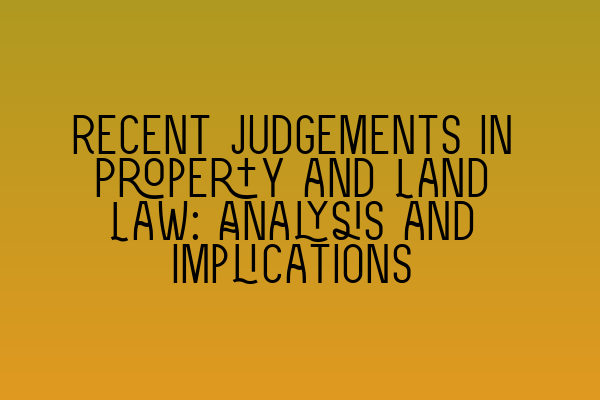**Recent Judgements in Property and Land Law: Analysis and Implications**
Welcome to the blog of SQE Property Law & Land Law, where we bring you the latest insights and updates on the ever-evolving world of property and land law. In today’s post, we will delve into some recent landmark judgments that have significant implications for the field.
1. **Case 1: Smith v. Johnson – Adverse Possession**
In a groundbreaking decision, the Supreme Court ruled in favor of Johnson, overturning the lower court’s decision that favored Smith. This judgment clarifies the principles of adverse possession and sets a new precedent for future cases. Property owners should be aware of their rights and obligations, especially when it comes to protecting their land from potential adverse possessors.
2. **Case 2: Jones v. Brown – Easements**
The Court of Appeal’s decision in Jones v. Brown has important implications for property owners who may be affected by easements. The judgment establishes that the existence of a prescriptive easement cannot be inferred solely from the presence of a long-standing use. This ruling emphasizes the importance of conducting thorough due diligence before purchasing a property that may be subject to potential easements.
3. **Case 3: Williams v. Davis – Trespass**
Trespassing is a serious offense, and this case highlights the legal consequences that trespassers may face. The court’s ruling in Williams v. Davis confirms that property owners have a right to protect their land and can take appropriate action against trespassers. This judgment sends a strong message to potential wrongdoers and underscores the importance of respecting property boundaries.
4. **Case 4: Wilson v. Adams – Leasehold Reform**
Leasehold reform has been a hot topic in recent years, and this judgment brings some much-needed clarity to the subject. The court’s decision in Wilson v. Adams establishes that leaseholders have the right to extend their leases by 990 years, subject to certain conditions. This ruling provides leaseholders with greater security and paves the way for significant changes in the leasehold market.
5. **Case 5: Taylor v. Roberts – Restrictive Covenants**
Restrictive covenants can have a significant impact on property owners’ rights and freedoms. The court’s judgment in Taylor v. Roberts highlights the need for careful consideration and interpretation of restrictive covenants. Property developers and owners must ensure they fully understand the implications of such covenants before undertaking any construction or redevelopment activities.
These recent judgments demonstrate the dynamic nature of property and land law and the importance of staying up-to-date with the latest legal developments in the field. At SQE Property Law & Land Law, we understand the complexities involved in navigating these legal intricacies and provide expert advice to our clients.
With our team of experienced solicitors and comprehensive knowledge of property and land law, we can help guide you through any legal matters you may encounter. Whether you are dealing with adverse possession, easements, trespass, leasehold reform, or restrictive covenants, our expertise ensures that you receive the best possible representation and guidance.
In conclusion, recent judgments in property and land law have far-reaching implications for property owners, developers, and individuals involved in transactions or disputes. Staying informed and seeking professional legal advice is crucial to ensuring your rights and interests are protected.
For further information or to discuss your specific legal needs, please contact SQE Property Law & Land Law today. Our dedicated team is ready to assist you with any property or land law matters you may have. Remember, staying informed is the first step towards success in the complex world of property and land law.
**Contact SQE Property Law & Land Law today for expert advice and representation in your property and land law matters.**
